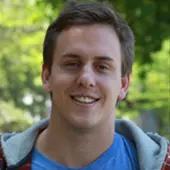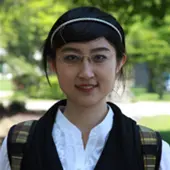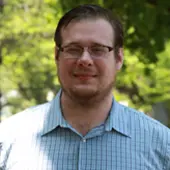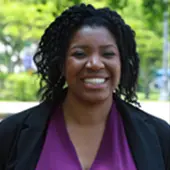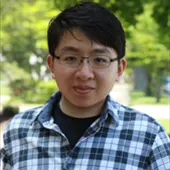2014-2015 Cluster Fellows
James Griffin
Department/Program: Chemical and Biological Engineering
Faculty Advisors: George Wells, Associate Professor of Civil and Environmental Engineering
Status of Studies: Completed Ph.D in Chemical and Biological Engineering
What is your area of focus at Northwestern?
Two current goals in environmental biotechnology are developing new processes to recover energy and nutrients from waste and adapting systems biology approaches to environmental biotechnology to better understand and control microbial communities. My goal is to use high throughput sequencing and molecular monitoring techniques to model and optimize microbial communities for resource recovery. During my graduate research, I hope to address pressing energy and water challenges while answering fundamental questions about microbial ecology.
Brief personal history:
I grew up in Santa Cruz, California and did my undergrad in chemical engineering at MIT. I got interested in water and energy sustainability while working at the Clean Energy Trust on local and regional technology development projects in 2012. I started my PhD in George Well’s lab in 2013.
Why were you interested in becoming a Cluster Fellow?
I’m thrilled to get to participate in the Cluster Fellowship because of the opportunities to learn from experts through programs like NUvention and mentor students interested in energy and sustainability. The Institute will help me connect with the energy community and make an impact with my research.
Updates:
I started a job at Ginkgo Bioworks as a bioinformatician. Ginkgo Bioworks designs, engineers, develops, tests, and licenses organisms. It discovers molecules in flavors, sweeteners, cosmetic ingredients, crop treatments, and pharmaceuticals. Gingko Bioworks also provides probiotic bacteria to protect the body from dangerous infections, and it generates libraries of molecules. It serves cultured ingredients, carbon mitigation, probiotics, and natural product discovery markets.
Angang Li
Department/Program: Civil and Environmental Engineering
Faculty Advisor: Aaron Packman,
Professor of Civil and Environmental Engineering and (by courtesy) Mechanical Engineering and Chemical and Biological EngineeringStatus of Studies: First Year
What is your area of focus at Northwestern?
My research focuses on developing a stochastic modeling framework to characterize the migration of carbon from thawing permafrost through the freshwater environment to the ocean, and the transformations that occur during this lateral translocation. This work aims to improve estimates of arctic carbon dynamics and CO2 outgassing from permafrost, and provide tools that can be used more generally to assess the fate of carbon in global climate models. This has important implications to sustainable management of carbon cycles.
Brief personal history:
I grew up in Beijing, China before attending college in the US. In 2013, I received my B.S. in Environmental Sciences and B.A. in Economics with minor in Mathematics from the University of Virginia, where I became increasingly interested in environmental fluid dynamics and its implications to sustainability. Following this interest, I came to Northwestern University to pursue a Ph.D. in Environmental Engineering and Science program.
Why were you interested in becoming a Cluster Fellow?
Addressing sustainability in a changing world requires a holistic view. In particular, the Cluster Fellowship promotes interdisciplinary communication and connection among Fellows on sustainability, which enriches my research by providing diverse perspectives. Besides, I would also love to bring in my own perspectives on river ecosystem dynamics by sharing my research with Cluster Fellows as well as undergraduate students from the course that I TA.
Aidan Mouat
Department/Program: Chemistry
Faculty Advisor: Tobin J. Marks, Vladimir N. Ipatieff Professor of Catalytic Chemistry and Chemical and Biological Engineerin, Materials Science and Engineering, Applied PhysicsStatus of Studies: Third Year
What is your area of focus at Northwestern?
My research focuses on the design and synthesis of heterogeneous solid acid catalysts with active sites that are highly selective in biomass-relevant transformations. The main technique I use for synthesis is Atomic Layer Deposition (ALD), which allows the deposition of atomically-thin metal oxide layers on a catalyst support. This advantage allows for rational design and control of active sites on the final catalyst, and enables me to tune acid strength and selectivity through chemical principle.
Brief personal history:
I was born in Atlanta, GA. I attended Emory University from 2005-2009 and earned a BS/MS degree in chemistry. My master's research was done in the lab of Cora MacBeth and focusd on organometallic synthesis. After graduating, I worked at Opti Medical Systems Inc. from 2009-2012 as a production chemist. In addition to managing production of core product materials, I also worked with the quality control and process engineering departments, and gained familiarity with rheology and coating technologies. I came to Northwestern in June of 2012, first working in the lab of Tobin Marks and focusing on the synthesis of homogeneous polyethylene polymerization catalysts and later joining both the Marks lab and the lab of Peter Stair, where I developed my current focus.
Why were you interested in becoming a Cluster Fellow?
My work is closely tied in with energy-relevant technologies, which at present is still largely dominated by oil. However, as the focus on fuel and fine chemical production turns more green, and as technologies are adapted to include renewable feedstocks, I believe there are many opportunities for expanding the current energy infrastructure to incorporate these new sources. The Institute represents not only the technological interests in green and renewable energy sources, but also an interest in developing infrastructure from an economic, civil, and even entrepreneurial perspective. The intersection of these different modes of thought is necessary to shift the current energy supply curve on a scale large enough to affect the world, and I am happy to contribute my own understanding to it.
Updates:
Aidan is currently the Chief Executive Officer at Hazel Technologies, Inc.
Nneka Uzoh
Department/Program: Business Administration
Faculty Advisor: Mark Werwath,
Clinical Full Professor, Director of Master of Engineering Management ProgramStatus of Studies: Second Year MBA Candidate
What is your area of focus at Northwestern?
I am pursuing an MBA with a focus on strategy and innovation. My intention is to use my background in energy and influence how businesses incorporate sustainability and innovation into practices and maintain or even increase profits.
Brief personal history:
I grew up in San Jose, CA but moved to the South where I completed my bachelors and masters in finance with an energy specialization. Before coming to Northwestern I spent a few years working in power finance in a variety of roles including electricity pricing, capital project valuation, mergers, and acquisitions, and natural gas trading.
Why were you interested in becoming a Cluster Fellow?
I am very interested in the opportunity to learn about energy and sustainability from other perspectives including science, law, and engineering, and hopefully share my own experiences. I am also very interested in shaping the future of the energy and sustainability curriculum at Northwestern and helping to propel Northwestern to be the top energy school in the Midwest.
Thomas Yu
Department/Program: Materials Science and Engineering
Faculty Advisor: Harold Kung, Walter P. Murphy Professor of Chemical and Biological EngineeringStatus of Studies: Third Year
What is your area of focus at Northwestern?
I am studying the electrode-electrolyte interactions in modern energy storage devices, particularly on the possibility of developing a novel surfactant-assisted electrodeposition to fabricate 2-D and complex 3-D nanostructured electrodes. The aim of the research is to provide a scalable and precise synthesis technique for nanostructured electrodes and better understanding of their electrode-electrolyte interactions, with the hope of clearing a path for efficient design and fabrication of new generation of high performance electrochemical energy storage devices.
Brief personal history:
I grew up in Shanghai, China and then spent my teenage years in Vancouver, Canada. I then conducted my BS and MS study in Materials Science and Engineering at Northwestern. During my final year of the BS/MS program, our team of NUvention-Energy graduates founded SiNode Systems, a student startup that is commercializing lithium ion battery technology developed here on campus. I became increasingly interested in research on various energy storage technology through my continuing involvement at SiNode and decided to continue my study in this field as a doctoral student.
Why were you interested in becoming a Cluster Fellow?
I believe that the Cluster Fellowship would allow me to further expand my professional network and enable me to be further involved in the various energy and sustainability development on campus. I hope to use the Institute programs to bring together more liked minded students and faculty members to share their experience and passion in related fields.
